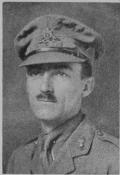
|
The King's School Canterbury |
Roll of Honour |
| Major John Edouard Marsden BROMLEY DSO | |
|
17th Battery, 41st Brigade Royal Field Artillery Date of birth: 23rd March 1882 Date of death: 7th June 1918 Killed in action aged 36 Buried at Anzin-St. Aubin British Cemetery Plot IV Row C Grave 6 |

|
| He was born on the 23rd of March 1882 the elder son of John Bromley, musician, and Rebecca (nee Buchanan) of 30, Manchester Street, Manchester Square, London W1. He was educated at Hinwick House School, Wellingborough and at the King's School Canterbury from January 1898 to July 1900 where he won his sports colours in 1900. He was known at school as being a clever caricaturist. On the 13th of April 1901 he joined the Natal Mounted Police as Trooper 2558 and saw action in the South African War where he was awarded the Queens's Medal with three clasps. He also saw action during the Natal Native Rebellion in 1906 under General Dartnell. He was an expert in Zulu and other native languages and was serving with the British South African Police Force in Northern Rhodesia as a Native Commissioner of Police on the outbreak of war in 1914. He returned to the UK on board the SS "Llandovery Castle", landing at Plymouth on the 13th of November 1914 and applied for a commission on the day he landed. He was commissioned as a 2nd Lieutenant in the 2nd Reserve Cavalry Regiment on the 25th of November 1914, and was promoted to Captain and transferred to the Royal Field Artillery on 10th of May 1915. He embarked for service in France the same month where he joined 14th Brigade, Royal Horse Artillery Ammunition Column. He went on home leave from the 25th of October to the 4th of November 1915 and, in December 1915, he was admitted to 9 General Field Hospital at Rouen with a poisoned leg. He was evacuated to England and, after treatment, he was transferred to Lady Evelyn Mason's Hospital in London in January 1916 and was discharged later that month when he was granted six weeks sick leave. He returned to France in September 1916 where he joined 15th Battery, 36th Brigade, Royal Field Artillery. He went on home leave from the 7th to the 17th of January 1917. He was promoted to Major in February 1917 and on the 1st of March 1917 he was posted as Commanding Officer to 17th Battery, 41st Brigade Royal Field Artillery, joining them when they were in positions at Le Sars. He went on home leave from the 28th of May to the 8th of June 1917 and from the 2nd to the 12th of September 1917. He was wounded on the 25th of October 1917 when the Battery was in action at St Julien during the Third Battle of Ypres but stayed at duty. He was awarded the Distinguished Service Order which was announced in the London Gazette of the 18th of January 1918. The citation appeared in the London Gazette of the 25th of April 1918 and read:- "For conspicuous gallantry and devotion to duty. He assisted in getting wounded out of a dug-out which had been blown in, under intense shell fire, and helped them to the dressing station. When an ammunition dump was set on fire, he put it out under heavy shell fire. When a dug-out, containing 15 men was blown in, though himself wounded, he worked for an hour and a half rescuing them under intense shelling. He showed splendid courage and coolness." On the 8th of January 1918 he went on a battery commander's course, rejoining his unit on the 20th of February. On the 27th of February 1918 he reported sick and was released to No. 8 Convalescence Hospital on the 9th of March where he remained until he joined the Depot at Etaples on the 4th of April 1918; he returned to his unit on the 7th of April. He was mentioned in despatches in the London Gazette of the 21st of May 1918. On the 7th of June 1918 17th Battery, 41st Brigade Royal Artillery was in positions at Blagny Chateau near Arras. Enemy activity was quiet during the morning but at 1.30pm they began firing at Blagny Chateau with 77mm artillery fire with occasional rounds from a 4.2 battery also being fired. During this attack a stray round from the enemy 4.2 battery landed at the entrance to the 17th Battery mess, killing John Bromley and slightly wounding 2nd Lieutenant Macbeth, who remained at duty. He was buried at Anzin the following day His father received the following telegram dated the 11th of June 1918: - "Deeply regret Major J.E.M. Bromley RFA 41st Brigade killed in action June seventh. The Army Council express sympathy." His Colonel wrote:- "I looked upon him as a friend as well as a fine soldier and an extraordinarily gallant man." His medals were sold at auction in London on the 29th of June 2006. |
|
Back